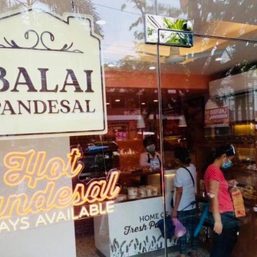SUMMARY
This is AI generated summarization, which may have errors. For context, always refer to the full article.

MANILA, Philippines – It’s not every day you see a kariton-inspired sorbetes cart strolling around the streets of Belgium. But thanks to Kamille Rodriguez’s efforts, kababayans abroad can readily indulge in this rare sight and the comfortingly familiar treat without having to travel back to the Philippines.
Sorbetes ni Manong Jelle is a small, Filipino-inspired micro ice creamery founded in Belgium by Kamille, a Filipina, and her Belgian husband, Jelle Bories. The humble ice cream shop specializes in Asian and Filipino-inspired sorbetes – classic Filipino ice cream that is also known as “dirty ice cream” and typically sold on the streets in carts.

The hardworking two-man team makes the sorbetes from scratch by hand using only real ingredients and fruits – no powders, artificial flavoring, or pre-mixes are in the ice cream bases and toppings. Only all-organic fresh milk, cream, cane sugar, and egg yolks are used.

Aside from product development, manufacturing, logistics, and sales, husband and wife Kamille and Jelle are also in charge of marketing. Even with their own daytime jobs, they are both on the ground daily, grinding hard to sell homemade sorbetes on their kariton-inspired ice cream bike to the locals, foreigners, and Filipinos of Belgium.

It definitely is uncharted territory to be selling a traditional Filipino treat in a foreign, faraway land, but Kamille and Jelle manage to make it work. The journey to overseas sorbetes fame wasn’t easy (and still isn’t), but the couple’s love for ice cream (and each other) helps keep their kariton rolling.
Finding true love
How did Sorbetes ni Manong Jelle start? Not the way most ice cream shops typically do – it all began because of a nurse shortage in Belgium.
“Around 2013, I flew to Belgium to work as a nurse. I was hired by a hospital in Sint Niklaas due to shortage. I remember during that time (I was a Batch 2008 graduate), nursing was one of the most in-demand courses in the Philippines because we could easily apply to another country,” Kamille told Rappler.
She added that it was never her intention to work in Belgium and that she was actually busy applying for the US, Canada, and the UK. However, waiting for an approved US visa was taking too long, and Kamille also realized that working in the UK and Canada would be extra costly since she still needed to study. Luckily, she found a job opening in Belgium and got accepted.
“The first two years were a difficult adjustment because of the language barrier – it’s Dutch, and I’m still having a hard time – and the difference of the nursing practices here and in the Philippines,” said Kamille, who is currently still working as a part-time nurse in the same hospital. Kamille landed a good job abroad, but her move reaped way more than that.
“I met my husband around eight months after flying to Belgium through a dating website. We have been together since then. We are almost eight years together and almost six years as a married couple. We currently have two kids now named Sebastian and Isabelle,” Kamille shared.

Why ice cream?
Well, why not? Ice cream is universally loved, and it just so happened that Jelle, who is a pastry chef by profession, was always interested in making his own. “You have more control with sweetness, flavor, and creaminess if you make your own,” Kamille said.

A year before Sorbetes ni Manong Jelle launched, the couple bought an ice cream machine to tinker with at home. Thanks to Kamille’s cravings for Filipino flavors she missed from home (and were not available in Belgium), her husband started experimenting with sorbetes. Eventually, they let friends and family try it.
“And they loved it! They urged us to sell it to other kababayans because they said it has ‘potential.’ We started selling through online marketplaces and Filipino Facebook groups. Our first customer posted it on her Instagram, and the rest is history,” Kamille said.

Immediately, their mission was born: to promote the Philippines through their sorbetes, both for Filipinos and non-Filipinos.
“Filipino cuisine – I think especially in Europe – is often unrecognized and underrated. We want to show that Filipino cuisine is as exciting as our neighboring countries,” Kamille said.
Love for local
Kamille made sure to incorporate the Philippines in almost every product, even in flavors that aren’t exactly “Filipino-inspired,” like the Rum Raisin. With that flavor, they still use a Filipino rum brand from Negros.
For their popular seasonal Philippine Mango flavor, they use only real Filipino mangoes; for their Rocky Road sorbetes, they used to incorporate Davao-farmed chocolate, which Belgian clients really loved.
“We do have good quality cacao in the Philippines actually, but unfortunately, we cannot buy the Filipino brand chocolate anywhere in Belgium,” Kamille said.

Local flavors continue to gain the most popularity. Kamille and Jelle’s best-selling Ube Cheesecake flavor garnered a lot of positive buzz during the Carpigiani Gelato Challenge 2021 contest in November (which, unfortunately, they did not win). The Ube Cheesecake is made from a handcrafted ube (purple yam) ice cream base, mixed in with a generous amount of cream cheese, then loaded with salted-buttered honey graham.

They even have a special Halo-Halo flavor, which consists of classic halo-halo toppings like sweetened beans, macapuno strings, nata de coco, ube, and more. They also have other well-loved Pinoy flavors inspired by native fruits, desserts, snacks, and kakanin, such as durian, ube macapuno, coconut, chocnut, maja blanca, ube quezo, yakult, sapin-sapin, guyabano, buko pandan, fruit salad, and cookies and cream.

Of course, their best seller remains to be the 100% Ube sorbetes, followed by the Avocado, made with ice and condensed milk. They also have ice cream cakes, like the Frozen Ube Brazo de Mercedes, Halo-Halo Cake, and Mango Tres Leches.

“The recipes are often made by my husband. He makes everything from scratch and only uses 100% real food. Our sorbetes is with less air, but full of flavors – we make gelato-style sorbetes, actually. I just give him the inspiration since I am the one who has experienced it in the Philippines,” Kamille said.
A scoop of happiness and nostalgia
It’s always a risk to introduce an unconventional, foreign delicacy to a new community, especially if you aren’t completely sure how the general public would respond. Luckily, Sorbetes ni Manong Jelle was well-received immediately by Kamille’s own kababayans, whose initial feedback was “very, very good.”

“They are happy that they have a lot of options already in choosing flavors. I remember, before we started, we could only buy ube-flavored ice cream in stores here, made from outside Belgium. We had very limited options,” Kamille said. Now that is no longer the case!
“We even regularly offer limited edition flavors, as we can get crazy with them, which our clients love. They also find it convenient that we deliver it door-to-door, since we started during the peak of the pandemic and it was a semi-lockdown here in Belgium,” she added. Since people were still afraid to head out, Kamille decided: Why not bring a scoop of happiness to them instead?
Sorbetes, in a way, provides Filipinos who haven’t been back to the Philippines for a while a much-needed piece of home. “They are glad that Manong Jelle can bring them back to the islands with Filipino-inspired artisan ice cream. We have a slogan, ‘We can bring you back to the Islands,’ because that is our main goal for the customers,” Kamille said.

Because the item is so unique in their part of the world, Kamille said their advantage as a small business is that they don’t have a lot of competition.
“The market is still good and not very saturated for an artisanal ice cream owner. We can proudly say that we are the first micro-creamery [that] specializes in Filipino ice cream here in Belgium,” Kamille said.
Even though majority of their clients are Filipinos, they began seeing an increase in foreign customers after investing in their new kariton bike, which launched in September 2021. Because of the mobility and visual appeal of the bike, the brand is being recognized more by the locals in the city.
Slow but steady wins the race
Operating a business with very limited manpower and barely a war chest of emergency funds is no easy feat, especially for parents of two young children. Because of these constraints, Kamille and Jelle had to pursue part-time day jobs to focus more on their business and family.

“Operating on our own is honestly very hard. We try to do everything on our own as much as possible to lessen the expenses. My husband does the ice cream making and logistics (shopping for materials and delivery), as well as talking to other business owners,” Kamille said. She does all the marketing (photoshoots, social media, and reaching out to the press) and majority of the paperwork.

“We still produce our ice cream in our converted kitchen at home. Our business model right now is delivering ice cream and selling it through our newly-invested kariton-inspired ice cream bike,” Kamille said. They are also currently supplying ice cream to different restaurants in Belgium.
According to Kamille, this is so they can save enough and have extra income to reinvest in the business.
These funds will ideally go to Sorbetes ni Manong Jelle’s first-ever physical ice cream shop in Belgium – a dream that Kamille and Jelle have always had for Filipinos and foreigners in their community. But for now, Manong Jelle’s sorbetes remains home-bound and street-focused.
“Building an ice cream business is very expensive due to the expensive machines and materials. So we want to expand in a slow and steady pace, as we don’t have a lot of money at our disposal. We don’t want to gamble all our savings for it because we already have kids,” Kamille added.
What’s next?
It’s safe to say that Manong Jelle’s sorbetes is here to stay! Kamille said their next plans include selling their ice cream by the scoop in other cities starting April until October. They will also be joining festivals and events, and, in fact, have a few bookings already (if the COVID-19 situation allows). For Kamille, those events are always great opportunities to get to know their local clients better and explain flavors that are very new to them.
“We always have to explain what is ube, or why is durian sticky, or how does jackfruit taste like,” Kamille said.
Of course, the backbone of the business will still remain – promoting Filipino flavors and culture through high-quality sorbetes.
“We will continue to create and sell Filipino-inspired ice cream and maybe pastries, too. Hopefully, we can also export our products to the neighboring European countries in the future,” Kamille said. – Rappler.com
You can check out Sorbetes ni Manong Jelle‘s complete menu on their website.
Add a comment
How does this make you feel?




![[WATCH] Food Secrets: Belgium’s national dish – potato fries](https://www.rappler.com/tachyon/2023/07/food-secrets-belgian-fries-scaled.jpg?resize=257%2C257&crop_strategy=attention)


![[OPINYON] Takoyaki tattoo at ang business model ng pang-iinis](https://www.rappler.com/tachyon/2024/04/20240410-Takoyaki-tattoo.jpg?resize=257%2C257&crop_strategy=attention)


There are no comments yet. Add your comment to start the conversation.